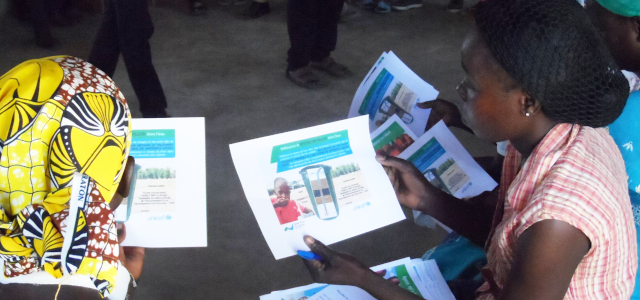The new report focuses on the evaluation of the gender-related impacts of fluorosis in the Meri Subdivision (Far North Region), and it is a continuation of the project "Improving the resilience of WASH services in Mayo Tsanaga catchment through pilot initiatives", which was implemented from April 2017 to June 2018.
Geogenic fluoride contamination of groundwater resources in Northern Cameroon and its impacts have only recently been identified and responses have been lagging behind. Professor Fantong, an active member of GWP in Cameroon, published in 2010 a scientific publication on “Geochemical provenance and spatial distribution of fluoride in groundwater of Mayo Tsanaga River Basin, Far north Region, Cameroon: implications for incidence of fluorosis and optimal consumption dose“. This alerted stakeholders on the issue of fluoride contamination, which is affecting and threatening the oral/dental health of about 500,000 Cameroonians.
Over the years, some resource persons and members of the local communities insisted on fluorosis having a more significant psychosocial impact on girls and women than on men and boys. However, due to the absence of any documented investigation or evidence of these, these issues were not considered in the sensitization messages that were developed.
Gender connection demonstrated
The new report provides evidence of the gender connection, and pointed to significant psychological, social and possibly economic impacts on the women and girls affected. The social stigma faced by those affected is impacting career choices, relationships and even leads to migration back to impacted zones from safe zones. Furthermore, the analysis shows that the population has limited information on the illness – it is seen as a hereditary malady transmitted by mothers or seen as an ethnic illness. The report calls for mobilization from the public sector, NGOs and other stakeholders to reduce fluoride exposure, raise awareness, reduce the social stigma and address psycho-social impacts, through a gender-sensitive approach and building on women’s capacities.
The workshop in Maroua was attended by representatives of the United Nations system (UN Women, UNICEF), sectoral ministries involved (MINEE, MINSANTE), the 3rd Deputy Mayor of the Municipality of Meri, local NGOs, Community Initiative Groups and Civil Society Organizations. The participants made some important recommendations to address fluoride exposure, including:
- Encourage the use of fluoride filters in the municipality of Meri;
- Advocate with public authorities to make it a public health issue;
- Produce an audio-visual documentary to raise awareness of the phenomenon under study;
- Train people on the process of fluoride removal from fluoride-rich groundwater for drinking purposes;
- Look into the possibility of adapting the awareness raising and sensitisation materials to better capture the gender differentiated psychosocial impacts of fluorosis as brought out by the gender study, and thus make them gender sensitive;
- Organise capacity development workshops and trainings on fluorosis for communities within the basin that target both men and women to further strengthen the local understanding of the origins and impacts of fluorosis;
- Promote the systemic generation of gender disaggregated data during surveys conducted by governments, development partners and other key stakeholders of the water sector.
Background: Gender equality is key to achieving water security and is a key component in Integrated Water Resources Management (IWRM). GWP has been proactively supporting gender equality, and since 2014 has a Gender Strategy. GWP also developed a Gender Action Piece together with partners in 2017 – the document was endorsed in the High-Level Panel on Water in their Outcome Document, "Making Every Drop Count".
